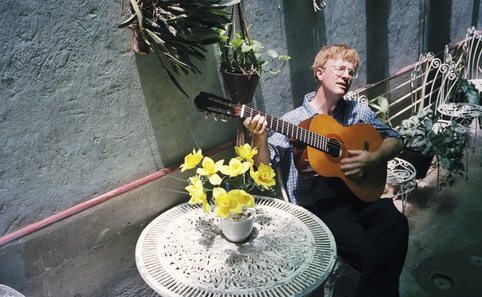
 Mateo is a fascinating look at a culturally liminal figure, who slips back and forth between the culture he was born in and the culture he’s chosen. Mateo is the stage name of Matthew Stoneman, America’s most famous “gringo mariachi.” It almost sounds like a punchline, and there’s no shortage of people chuckling as Stoneman makes the rounds in Mexican restaurants in Los Angeles; with his thinning red hair, pale skin, and Chaplinesque gait, he is about as different from the well-defined mariachi stereotype as possible. But when he starts singing to an appreciative audience, the joke is over. He’s good. Very good. More than one onlooker describes him as having the “voice of an angel.” Mateo the film, from director Aaron Naar, shows in part how this incongruous man came to be.
Mateo is a fascinating look at a culturally liminal figure, who slips back and forth between the culture he was born in and the culture he’s chosen. Mateo is the stage name of Matthew Stoneman, America’s most famous “gringo mariachi.” It almost sounds like a punchline, and there’s no shortage of people chuckling as Stoneman makes the rounds in Mexican restaurants in Los Angeles; with his thinning red hair, pale skin, and Chaplinesque gait, he is about as different from the well-defined mariachi stereotype as possible. But when he starts singing to an appreciative audience, the joke is over. He’s good. Very good. More than one onlooker describes him as having the “voice of an angel.” Mateo the film, from director Aaron Naar, shows in part how this incongruous man came to be.
Matthew Stoneman was born in New Hampshire, to a family he is now estranged from, in no small part due to a five-year prison stint he served in Los Angeles for robbery. But it was in prison that he discovered his talent and salvation, as his Mexican cellmates taught him Spanish and traditional bolero music. Stoneman is an interesting subject, because while he allows Naar total access to his often-unglamorous life, he doesn’t have the compulsive need to explain and justify himself that we usually see in documentary subjects. He spends little time talking about the past, mentioning his prison stint matter-of-factly and moving on.
Mateo lives a dual life; earning money and living ascetically in Los Angeles, a city he hates but must stay in due to court mandate, and then spending that money profligately while living and recording in Havana, Cuba. The two lives couldn’t be more different. In Los Angeles he lives in almost total isolation, in a filthy one-room apartment, spending all of his time trying to earn money. His possessions are crammed into a storage locker and the trunk of his car, both of which overflow with cassette tapes and press clippings, available on demand in case anyone doubts his bolero bona fides. In Havana, however, he is another person completely. Social and happy, he spends his days recording and his nights chasing prostitutes and other women. The musicians hold him in high esteem and he has an adoptive family who welcome him back each time with open arms.
Seeing Stoneman in this Jekyll and Hyde negotiation of the contrasting cultures forms the foundation of the film. Stoneman fits into a long tradition of Americans going abroad on a mission of self-liberation; his sexual libertinism makes him seem almost a mariachi Henry Miller and calls into question the license he feels to act one way in one country and another in another. But it’s not just the women that attract him to Cuba. As he tells his family, in Havana there is community and a vibrant street life, compared to the sealed-off car culture of Los Angeles. But the contrast in musical culture is also striking. In Havana, Mateo walks down the street with his guitar and people call out to him to play and he can instantly delight them; music is something organic and shared with everyone. In the hyper-fragmented music culture of America, everyone has their own highly specific taste and Mateo’s music is marginalized, tolerated only in certain settings.
In one final cultural twist, the end of the film sees Mateo go to Japan and play to large and appreciative crowds. In today’s world, it’s impossible to predict what kinds of culture will strike a chord where, and the possible combinations are as strange and wonderful as a gringo mariachi.